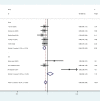Association between CASC16 rs4784227 polymorphism and breast cancer susceptibility: A meta-analysis
- PMID: 34260521
- PMCID: PMC8284751
- DOI: 10.1097/MD.0000000000026215
Association between CASC16 rs4784227 polymorphism and breast cancer susceptibility: A meta-analysis
Abstract
Objective: To explore whether rs4784227 polymorphism of CASC16 is correlated with risk of breast cancer.
Methods: Relevant studies up to December 24, 2020 were searched in PubMed, Embase, Web of Science, CNKI, VIP, and WANFANG databases. Data were analyzed by using Stata 12.0. Pooled odds ratios (ORs) and 95% confidence intervals (CIs) were calculated, and country-based subgroup analyses were conducted. Sensitivity analysis was conducted to assess the stability of the results. Publication bias was assessed by using the Egger regression asymmetry test and visualization of funnel plots.
Results: Seven case-control studies enrolling 4055 breast cancer cases and 4229 controls were included. rs4784227 was found significantly associated with increased risk of breast cancer in a dominant (OR = 1.301, 95% CI = 1.190-1.423, P < .001), a recessive (OR = 1.431, 95% CI = 1.216-1.685, P < .001), and an allele model (OR = 1.257, 95% CI = 1.172-1.348, P < .001), while an over-dominant model showed that rs4784227 was correlated with decreased breast cancer risk (OR = 0.852, 95% CI = 0.778-0.933, P = .001).
Conclusion: The rs4784227 polymorphism of CASC16 gene is correlated with breast cancer susceptibility.
Copyright © 2021 the Author(s). Published by Wolters Kluwer Health, Inc.
Conflict of interest statement
The authors have no conflicts of interests to disclose.
Figures
References
-
- MPH RLS, MPH KDM, DVM AJ, PhD. Cancer statistics, 2020%J CA: A Cancer Journal for Clinicians. 2020; 70(1). - PubMed
-
- Hong-da. CW-qLNCM-mRJ-sSJ-fC, jie LJLC-qYX-yCHDMH Preliminary Analysis of Cancer Screening Program in Urban China from 2013 to 2017 2020;29(1):01–6.
-
- A MK, A GP, C B. Agreement between breast cancer risk estimation methods. J National Cancer Institute 1996;88(18): - PubMed
-
- Fischer C, Kuchenbacker K, Engel C, et al. . Evaluating the performance of the breast cancer genetic risk models BOADICEA, IBIS, BRCAPRO and Claus for predicting BRCA1/2 mutation carrier probabilities: a study based on 7352 families from the German Hereditary Breast and Ovarian Cancer Consortium. J Med Genet 2013;50(6):360–7. - PubMed
Publication types
MeSH terms
Substances
Grants and funding
LinkOut - more resources
Full Text Sources
Medical
Molecular Biology Databases





